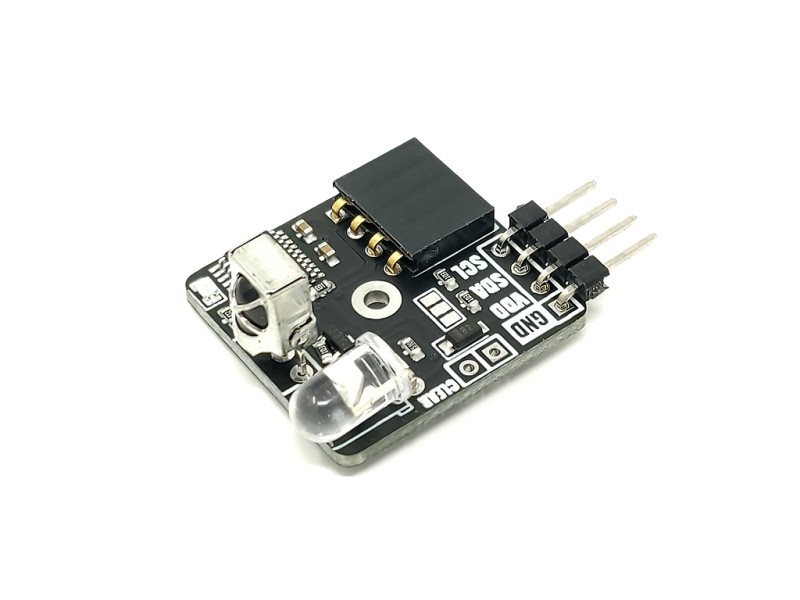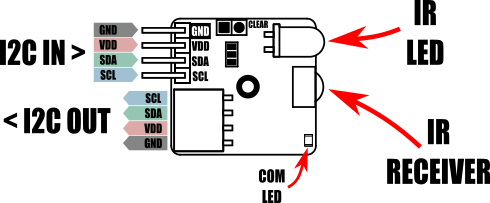Hobby Components Uno...
The Hobby Components prototyping shield for the Arduino Uno allows you to add your own custom...
- Currently Out of Stock










The mLink NEC IR Transceiver is a small serial I2C based module that is capable of sending and receiving infrared remote control signals compatible with the NEC protocol.
The NEC IR protocol is the prevalent standard for infrared remote communication, widely adopted by various IR-enabled devices like TVs, set-top boxes, air conditioners, and projectors. With this module, you can use your microcontroller to effortlessly capture and transmit signals to and from these compatible devices, making it an excellent choice for home automation projects.
The mLink NEC IR Transceiver is a small serial I2C based module that is capable of sending and receiving infrared remote control signals compatible with the NEC protocol.
The NEC IR protocol is the prevalent standard for infrared remote communication, widely adopted by various IR-enabled devices like TVs, set-top boxes, air conditioners, and projectors. With this module, you can use your microcontroller to effortlessly capture and transmit signals to and from these compatible devices, making it an excellent choice for home automation projects.
Compatible with microcontrollers equipped with an I2C interface, including popular Arduino models, wireless ESP devices, and Raspberry Pi, this module offers versatile control options. As part of the mLink series, it seamlessly integrates with other mLink modules. This means you can easily daisy-chain multiple mLink modules, enabling centralised control through a single serial interface.
For Arduino users you can use the mLink library (see forum for library and examples) to control any type of mLink module. Only one single instance of the library is needed to control multiple types of mLink modules, resulting in very little resource overhead and therefore making it great for Arduinos with small amounts of memory and pin counts.
For Raspberry Pi users we have a Python module which can be installed via pip or downloaded and installed directly from our forum. Please see the mLink Python forum thread for requirements and download link here: viewtopic.php?f=131&t=3062&p=8592#p8592

Module code: HCMODU0195
Supply voltage (VDD): 5V
Current consumption (idle): 6mA
I2C Interface speed: 400kbits/s (fast mode)
I2C default address (HEX): 0h5C
Maximum number of modules: 5 with pullups fitted, 112 with pullups removed*
IR modulation frequency: 38KHz
IR reception angle: ~45 degrees
IR reception distance (max): 18m
IR transmission range (max): 8m
IR compatible protocol: NEC infrared protocol
Module dimensions ex headers (LxWxH): 24.5mm x 23mm x 13mm
*Note the maximum number of connected modules will depend on cable lengths and power requirements of each module. Do not exceed 5 mLink modules connected in series with I2C pullups fitted to all modules.
For more information, including Arduino connection example and sketches, Raspberry Pi example and sketches, other useful information and a link to the exclusive mLink library, please see our forum post here.
The Hobby Components prototyping shield for the Arduino Uno allows you to add your own custom...
The mLink WS2812 LED driver is a serial (I2C) module intended for driving WS2812 5V RGB LEDs....
Our Ultimate Sensor Kit has been revamped, and, unlike most in the market, is mercury free! It...
The SmartRFy digital Rx module provides a set of 4 digital output pins which can be remotely...
This kit allows you to build your very own maze solving robot. It comes complete with...
We've partnered up with the fabulous guys over at EDTracker to bring to you the EDTracker...
The Hobby Components prototyping shield for the Arduino Mega allows you to add your own custom...
The mLink port expander is a serial (I2C/IIC) digital I/O module. It allows you to add 12...
The mLink Character LCD series consists of serial (I2C/IIC) displays available in two sizes:...
This is the latest Revision 3 PCB which allows you to simplify your build of a DIY EDTracker -...
The mLink L9110 motor controller is a serial (I2C) 2 channel DC motor driver that is capable...